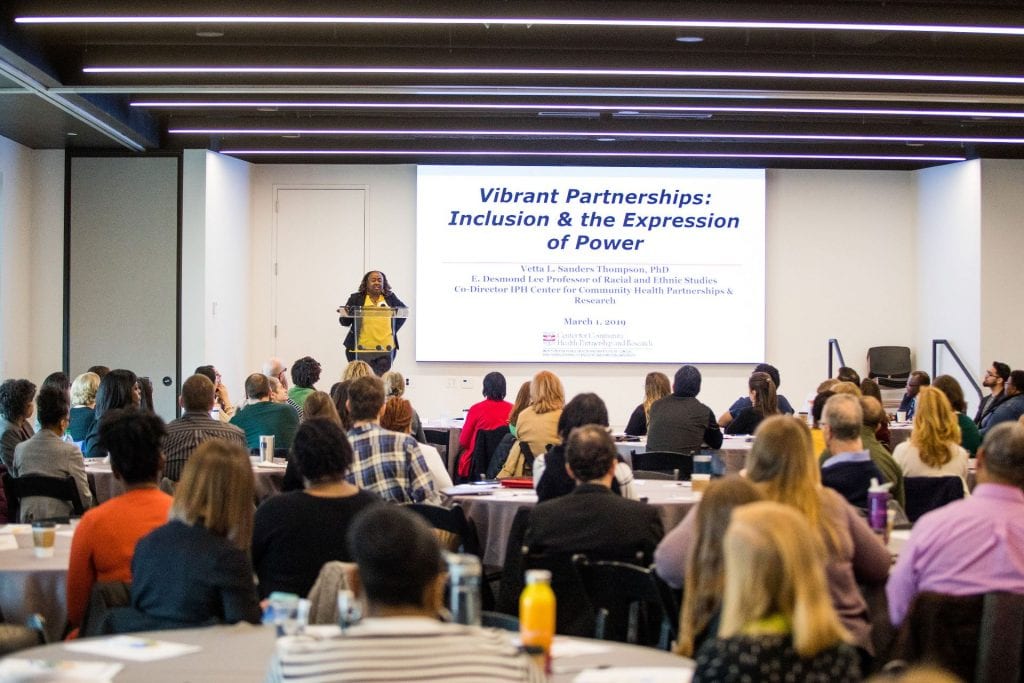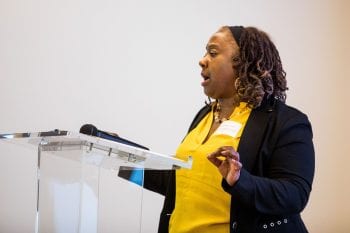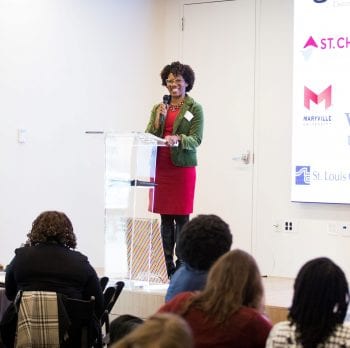
On March 1, community members and stakeholders gathered for the Building Vibrant Partnerships: Community and University Engagement Summit. Energy was high as participants arrived early and began talking, laughing, and connecting with one another. By the time the event began, the room was filled with well over 180 people who shared the goal of exploring opportunities to engage in meaningful, co-created community partnerships. The summit was designed as a joint project between local colleges/universities and nonprofit and civic institutions with the aim of deepening dialogue on the best practices for partnership throughout the region.

The summit’s keynote speaker was Dr. Vetta Sanders Thompson (pictured right), the E. Desmond Lee Professor of Racial and Ethnic Diversity at the Brown School at Washington University in St. Louis. Dr. Sanders Thompson’s funded research examines identity, psychological consequences of perceived discrimination, and promotion of cancer screening among African Americans. Her community-engaged research supports community efforts to achieve equity in health. In her keynote, she stressed the central importance of equity, accountability, respect, and trust in partnerships, and she emphasized the ultimate goal behind collaborative efforts:
“Bringing people to the table is not the end game. Meeting and agreeing on goals is not the end game. Data sharing is not the end game. Don’t get me wrong – it’s great and we are getting there and learning, but this is not the goal. The goal is social, economic, and educational change, so that all members of our community are able to live, work, and play knowing that there is opportunity and access for them and their children.”
Dr. Sanders Thompson ended her speech with a crucial reminder:
“Respect and trust are required to build vibrant partnerships. They and the partnerships that they allow us to build also allow us to hold each other accountable for results: decreases in inequity, shelter for our citizens, healthy food, opportunities to learn and be prepared for meaningful work that results in a livable wage. Our futures quite literally depend on it.”
The themes from Dr. Sanders Thompson’s speech were woven throughout the day in the dialogue occurring among participants. In addition to Dr. Sanders Thompson’s powerful keynote, the day included two panels entitled “Equity & Data” and “Field Notes on Campus-Community Partnerships.” The first panel discussed the measurement, analysis, and tracking of racial disparities in St. Louis over time. The second panel focused on the panelists’ experiences as members of campus-community partnerships and their opinions on best practices for communicating program and project outcomes. Saras Chung of SkipNV gave a presentation on the organization’s methods of partnership community-based practice and research. The day concluded with roundtable discussions facilitated by Trevor Hicks, a fellow from SkipNV, and a closing activity to encourage reflection and continued action.

The Gephardt Institute for Civic and Community Engagement was among the community and higher education sponsors for the event, which was funded in part by a grant from Missouri Campus Compact. Stefani Weeden-Smith (pictured left), Assistant Director for Community Engagement, served as one of the event’s principal organizers, and Community Engagement Fellow Nichole Murphy supported the logistics and planning of the summit at every step in the process.
Stefani and Nichole discussed their experiences working on the summit and their hopes for continuing conversation. The most rewarding part, Stefani shared, was working with community and university partners across the region. Meetings with partners began in August 2018, and Stefani said, “These meetings have proven to be great spaces for exchange and celebration on where we are as a community on civic and community engagement.” She also discussed challenges in planning and implementing the event: “The hardest part was getting the right mix of presenters for the key note address and two panels. We had been very intentional in asking community members/ organizations, university partners, and government officials what they thought were our top priorities for this summit so our committee really wanted to make sure we delivered.” Nichole emphasized the central role of community partners in the planning stages. The topics for the summit were determined by a survey distributed to partners. Although incorporating so many voices was sometimes challenging, the summit’s outcomes and the engagement and investment of the participants proved the value of intentional listening and responding.
Both Nichole and Stefani stressed the importance of continuing to engage in intentional and equitable dialogue. Stefani said, “We need to take a look at who is at the table and how we are thinking about including more voices not usually included to offer new perspectives on the priorities of a community partnership.” Nichole seconded these sentiments as she reflected on her experience of the summit: “What the summit made abundantly clear to me, is that we are still coming to ‘the table’ and not having the necessary conversations to get us to the table equitably. We all arrive for collaboration without checking how our baggage, our bias, and our gate-keeping are preventing meaningful perspectives and experiences from being present and heard.” She also discussed the communication barriers that are sometimes unconsciously erected. “To remedy this,” she suggested, “we must think about the process of collaboration. What guide-rails are in place to ensure that we start with shared understanding? What keeps us from controlling access to these spaces in informal ways such as the language we use?” These questions and the many others raised by the summit will continue to spark discussion and reflection on the ways that community-university partnerships can most effectively serve the St. Louis community.
To learn more about university/community partnerships, contact Stefani Weeden-Smith at weeden-smith.s@wustl.edu.
Thank you to all the summit sponsors: FOCUS St. Louis, Maryville University, Missouri Campus Compact, Saint Louis University, St. Charles Community College, St. Louis Community College, United Way of Greater St. Louis, University of Missouri Extension-St. Louis County, University of Missouri-St. Louis, Washington University in St. Louis, Webster University.